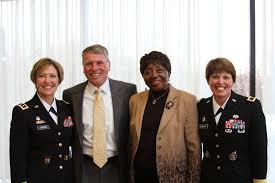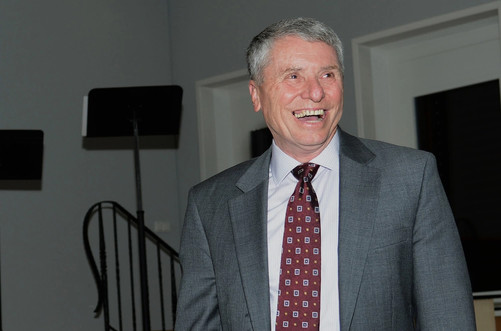Transformative Leadership Through Trust and Connection: BG(R) William T. Bester, RN, MSN, FAAN
- wardocspodcast
- Mar 27
- 3 min read

In the latest episode of War Docs' "10 Good Minutes on Leadership," BG(R) William “Bill” Bester, RN, MSN, FAAN, a distinguished leader with a 32-year military career, shares invaluable insights into effective leadership. As the 21st Chief of the Army Nurse Corps, BG(R) Bester discusses his leadership philosophy, which centers around empowering team members, removing barriers, and avoiding micromanagement. His wisdom offers a treasure trove of knowledge for listeners interested in people-focused leadership.
Empathy and Empowerment in Leadership
BG(R) Bester's leadership approach emphasizes the importance of empathy and empowerment. He advocates for involving team members directly in the decision-making process to ensure better outcomes and committed buy-in. By fostering open communication and leveraging the expertise within an organization, leaders can make informed decisions and build inclusive teams. His daily routine of personal engagement and connection with his staff highlights the power of trust and understanding in leadership.
The Art of Leading Without Micromanagement
One of BG(R) Bester's core leadership principles is removing barriers for team members. He shares his experience with micromanagement early in his career and his commitment to avoiding it. By allowing team members the autonomy to resolve issues and only stepping in when necessary, he fosters an environment of trust and independence. This approach not only empowers individuals but also harnesses the wealth of talent and expertise within the organization.
Building Inclusive Teams Through Trust and Connection
BG(R) Bester's leadership style is rooted in building trust and connection with his teams. He makes daily rounds to engage with staff members, taking a keen interest in both their professional and personal lives. This practice helps develop a level of trust where team members feel comfortable sharing candid feedback. By prioritizing personal engagement, leaders can better understand the needs of their teams and focus on areas that require attention.
Overcoming Leadership Challenges: A Lesson from 1994
BG(R) Bester recounts a challenging leadership experience in 1994 during his deployment to Würzburg, Germany. With less than 24 hours' notice, his team was deployed two weeks before Christmas. Despite the difficult timing, the intense workload helped keep the team focused, allowing them to work through the holidays. By maintaining open communication and providing daily updates, he kept the team informed and motivated, ensuring mission success.
The Role of Mentorship in Military Medicine
Mentorship is a key responsibility for leaders, according to BG(R) Bester. Reflecting on his own career, he highlights the importance of having mentors and being one. He shares how three senior civilian nurses guided him early in his career, helping him navigate challenging environments. By providing clear guidance on professional development, leaders can support the growth of military medical professionals.
Advice for Aspiring Leaders
In his closing thoughts, BG(R) Bester emphasizes the importance of curiosity and learning, especially during the early years of one's career. He encourages young officers to ask questions and seek knowledge, both clinically and within the Army structure. By taking advantage of available resources, aspiring leaders can build a solid foundation for their future roles.
HOW TO LISTEN AND WATCH
The episode featuring is available on YouTube and all major podcast platforms. Here are some popular links that will bring you directly to the episode:
YouTube: https://youtu.be/D0McJCEuq1E
Honoring the Legacy and Preserving the History of Military Medicine
The WarDocs Mission is to honor the legacy, preserve the oral history, and showcase career opportunities, unique expeditionary experiences, and achievements of Military Medicine. We foster patriotism and pride in Who we are, What we do, and, most importantly, How we serve Our Patients, the DoD, and Our Nation.
Find out more and join Team WarDocs at https://www.wardocspodcast.com/
Check our list of previous guest episodes at https://www.wardocspodcast.com/our-guests
Listen to the “What We Are For” Episode 47. https://bit.ly/3r87Afm
WarDocs- The Military Medicine Podcast is a Non-Profit, Tax-exempt-501(c)(3) veteran-run organization supported by volunteers. All donations are tax-deductible and go to honoring and preserving the history, experiences, successes, and lessons learned in Military Medicine. A tax receipt will be sent to you.
Make a Tax-Deductible Donation to Support WarDocs
WARDOCS documents the experiences, contributions, and innovations of all military medicine Services, ranks, and Corps who are affectionately called "Docs" as a sign of respect, trust, and confidence on and off the battlefield, demonstrating dedication to the medical care of fellow comrades in arms.
Follow Us on Social Media
Twitter: @wardocspodcast
Facebook: WarDocs Podcast
Instagram: @wardocspodcast
LinkedIn: WarDocs-The Military Medicine Podcast
WarDocs on YouTube
We Are WarDocs: https://youtu.be/IOC3sCNF9RI?si=NGNwguReefbVMgPW





























Comments